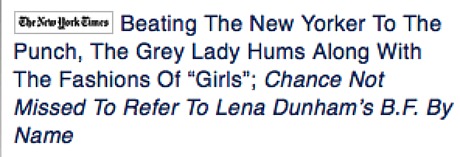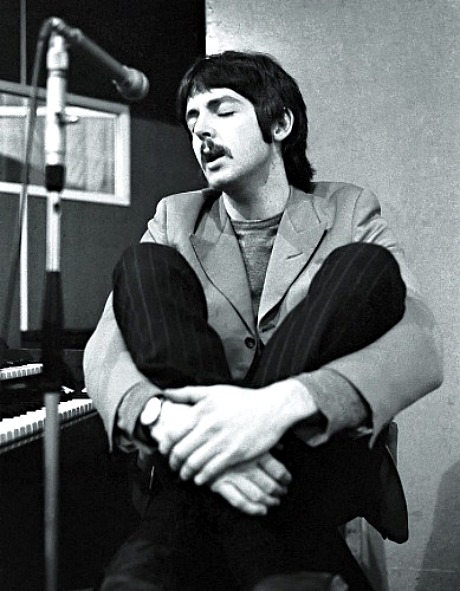Day: January 3, 2013
Why Do I Even Bother?
I say this every year and people rarely listen, but here goes anyway. There are at least 56 or 57 intriguing films playing at the 2013 Sundance Film Festival (which starts in two weeks). I’m there for nine days so if I really kill myself I might see 27 or 28. That’s 28 or 29 films I probably won’t see. Why aren’t p.r. reps offering to let folks like me see their entries in advance? Because they think it devalues a film to show it early.
A friend, by the way, has heard “very very good things” about Richard Linklater‘s Before Midnight (costarring and co-written by Julie Delpy and Ethan Hawke, directed & co-written by Linklater). He’s also heard that David Lowery‘s Ain’t Them Bodies Saints (Rooney Mara, Casey Affleck, Ben Foster, Nate Parker, Keith Carradine) “is the film people are touting as this year’s Beasts of the Southern Wild.”
Sounder
The idea is to identify the mystery soundtrack music within 10 or 15 seconds. It’s easy if you listen to the end.
Gossip Central
I love this Movie City News admonishment of N.Y. Times contributor Karen Schwartz for having mentioned in her 1.2.13 story about wardrobe choices for HBO’s Girls that star-writer Lena Dunham‘s boyfriend is Jack Antonoff, a member of the Grammy-nominated band Fun. Us broke the Dunham-Atonoff story (if you want to call it that) last September, and then they ran a photo of the couple on 12.9.

Another Anti-Stalinist Pushback
A wise and authoritative pro-Zero Dark Thirty piece has been posted today by Atlantic national correspondent Mark Bowden, who definitely knows his stuff, I’m told. The boiled-down quote to hold on to: ‘Torture may be morally wrong, and it may not be the best way to obtain information from detainees, but it played a role in America’s messy, decade-long pursuit of Osama bin Laden, and Zero Dark Thirty is right to portray that fact.”

Zero Dark Thirty “is remarkably accurate, and certainly well within what we all understand by the Hollywood label, ‘based on a true story,’ which works as both a boast and a disclaimer,” Bowden writes.
“There apparently was a female CIA field officer who performed heroic service in the 10-year hunt for bin Laden, and whose fixation on ‘Ahmed from Kuwait’ helped steer the effort to success. In the film she is seen butting heads with an intelligence bureaucracy that regards her fixation on Ahmed as wishful thinking. This makes for some dramatic scenes, and gives Jessica Chastain a great many chances to brood with ethereal intensity. The real life ‘Maya’ may have been even more lovely and tenacious, but she was just one of many officers and analysts focused on “Ahmed,” in an agency that never stopped regarding him as an important lead.
“The Saudi attacks in the beginning of the film, identified as the Khobar Towers incident, actually occurred in 1996, six years prior to the action in the film. The raid itself involved four helicopters, two Chinooks and two Black Hawks, not the three Black Hawks shown.” Note: I’m informed by a reliable source that the attack shown in the film is not the 1996 Khobar attack but a 2004 incident. 22 people were shot and killed in the ’04 attack. The CIA actively tried to prevent that attack and failed, as depicted in the film.
“Key planning sessions that happened in the White House Situation Room, chaired by President Obama, are depicted as having happened at Langley with CIA director Leon Panetta. Indeed, those who have accused the current administration of rolling out the red carpet for Bigelow and Boal in the hopes of hyping its role may be surprised to find that the president, whose participation was central throughout, has been almost completed edited out.
“The list could go on, but so could the list of fudged details for any film ‘based on a true story,’ whether it’s the Jerry Bruckheimer/Ridley Scott version of my book Black Hawk Down or Stephen Spielberg‘s Lincoln.
“Everyone understands the rules of this game. Theater is theater, not a scrupulous presentation of fact. We ought to feel betrayed only when filmmakers depart egregiously and deliberately from the record, as Oliver Stone so often has done, substituting what he thinks might be true or perhaps would like to be true for what is known. Reality, after all, is messy and only rarely lines up neatly enough for a two-hour script. Hollywood’s ‘true story’ aims only to color safely inside the lines of history.
“In this broader sense, Zero Dark Thirty is remarkably true. The hunt for bin Laden and other al-Qaeda leaders began with efforts that were clumsy, costly, and cruel. We wrongly invaded Iraq, for instance. We stupidly embraced a regime of torture in our military prisons. Some of the steps we took were tragic and are likely to endure as national embarrassments. But tactics, priorities, personnel, and even administrations changed over those years. The nation learned how to fight this new enemy intelligently.
“Through it all, the search for bin Laden proceeded with bureaucracy’s unique talent for obduracy. This isn’t as sexy or dramatic as watching Jessica Chastain paling before the stink and blood of rough interrogation, a red-tressed Ahab pursuing her white whale through bullets, bombs, and boneheaded bosses…but it stays within the lines.
As for the real story, the question of what role torture played is more difficult. The word ‘torture’ itself is pejorative, in that it equates keeping a prisoner awake with the most sordid practices of The Inquisition. But even mild pressure does tend to lead rapidly to severe mistreatment, as we saw during the Bush administration, which made the mistake of authorizing it, a step that predictably led to tragic and widespread abuses. These have been ably documented by, for one, Alex Gibney (a prominent critic of Zero Dark Thirty) in his stirring documentary Taxi to the Dark Side, and by tenacious journalists like Seymour Hersh and Jane Mayer, not to mention by the candid and devastating snapshots of depraved American military jailors.
“Dick Cheney and others have argued that this coercive regimen produced vital information that prevented terror attacks. So far we have only their word for it, and plenty of other informed voices that contradict it. I do not know the answer, although the reluctance of the current professedly anti-torture administration to explore and punish past abuses may suggest such practices were not altogether useless. The one thing that is certain is that they happened, and on a large scale. The abuses became such a scandal that the Bush administration itself halted the use of coercive methods in 2004. But by then the early interrogations that put ‘Ahmed from Kuwait’ on the CIA’s radar had all happened, and nearly all had involved torture.
“These are facts. Critics of these practices, and of the film, now find themselves in the curious position of arguing that torture played no role in the intelligence-gathering that led to Abbottabad. This is presumably because if the opposite were true, then the hunt’s successful outcome might lead weak minds to conclude that torture has been proved effective.
“Their logic has become, forgive the word, tortured. The key interrogation that focused the CIA’s attention on ‘Ahmed’ concerned Mohammed al-Qhatani. Those who now say that torture played no role in Qhatani’s revelations argue that he offered the information before the rough stuff started. I don’t know if that’s true, but I’ll accept it for argument’s sake. It hardly removes torture from the mix. The essential ingredient in any coercive interrogation is not the actual infliction of pain or discomfort, but fear.
“There can be little doubt that far before Qhatani was actually tortured, he knew damn well that he was in trouble. In Zero Dark Thirty, ‘Ammar,’ who is a fictional amalgam, gives up the name after, not during, his torture sessions. Does this mean that the prior pain and discomfort played no role? In either case, real or fictional, torture creates a context. It creates fear. The only way to know if Qhatani would have been cooperative without being pressured is to have conducted a torture-free interrogation, which did not happen.”
Sir Edmund Hillary
This photo of Paul McCartney (from a recently published coffee-table book by Henry Grossman) was taken during the Sgt. Pepper recording sessions in late 1966 or early ’67, when Macca was 24. This was it — the coolest, most live-wire creative peak moment he’d ever known in his life. It was never quite as pure or brave or experimental after that, certainly not in a trippy, harmonious, symphonic and satisfying-final-product sense.

In other words Macca made it to the top of the Matterhorn with a pick axe and ropes and hiking boots at age 24 and 1/2, and then very slowly and leisurely and profitably he began easing down the mountain with a walking stick right after that, and is still doing that stroll 45 years later. Nothing shameful in peaking young and then cruising. At least he peaked in a way that mattered, which is more than you can say for…what, 98% of the working musicians out there over the last couple of centuries?
Let this be a lesson to all 24 year-olds out there. Life is short. Do it now.
Mama Don’t Want No Django Bango
The Weinstein Co. sending out a very small box of Raisin Bran to nudge the Silver Linings Playbook vote…fine. “But look at the size of the box it came in!,” I muttered to myself. Then I checked the bottom of the box and found two Django schmangos, which I promptly dumped in the trash.

More SLP swag ideas: (a) a couple of dark-green Hefty garbage bags, (b) a DeSean Jackson Philadelphia Eagles jersey, (c) a green Philadelphia Eagles handkerchief, (d) a baggie of sample meds including Klonopin, Trazodone and Abilify.
Use Earphones
Here’s the mp3 for that James Rocchi Geek Nation Lunch chat that happened yesterday afternoon. But it’s not loud enough! Plus Rocchi’s voice isn’t as loud as mine. Can a Geek Nation tech guy fix the sound levels? You know something’s wrong when a nearby barking dog sounds louder than both of us. We were wearing Lavalier mikes; the dog wasn’t.

Early in the chat we were discussing Sam Raimi‘s Oz movie, and I actually blanked on James Franco‘s name….and I’m been a fan for years and know him personally through a mutual friend and everything. Weird.
“At The Bottom of Mount Everest…”
If Quentin Tarantino doesn’t somehow pull himself out of that half-smirking, half-reverential, “you’re sitting in a theatre seat and watching one of my movies, okay?” routine…that revisiting-and-reanimating-’70s-grindhouse pit that he’s dug himself into with Kill Bill, Inglourious Basterds and Django Unchained…he is going to be so lodged inside his own rectum that he’ll never escape from it. He may have already reached that point.
At the very least least Tarantino needs to think about adapting and interpreting the works of others (a la Jackie Brown) on an every-other-film basis in order to flush out the pipes and — brazen concept here! — swim laps in a reality pool that he didn’t create.
Because with Django I’ve gotten to the point (and I may be a kind of canary-in-the-coal-mine as I sometimes explore or uncover perception and attitude realms that have not been widely shared) that I am actively dreading the next film that Tarantino pulls out of his ass because I know exactly what it will be, how it will sound, the names of the all-but-out-of-work actors he’ll probably use in co-starring roles and how it will probably end and so forth.
He’ll never be able to reconstitute himself as he was 20-odd years ago, shooting his wad with three blasts — Reservoir Dogs, True Romance, Pulp Fiction — plus that Avary-penned Sleep With Me riff about the gay subtext of Top Gun plus his subsequent rewrite work on Crimson Tide and all that…those days are gone. So the only way out of this “these are the kind of movies I loved when I worked at Video Archives” hole is adapting a book or a screenplay-by-someone-else every other film. Because to me, his ass-realm is starting to become toxic.
Which is why I find it mildly interesting that he derided the process of adapting and the work of David Fincher in particular on a Charlie Rose show three years ago, to wit:
“One of the most talented filmmakers of my generation is David Fincher,” QT said, “but he’s not in the same category as me because I’m a writer director…that makes it a different thing. Writer-directors come out and there’s a real voice there, but it’s hard work to go that blank piece of paper and start from square one, start from scratch, every single solitary time…everything you’ve done before not only does not help you but it can even hang over your head. That is a tough row to hoe. And you make less movies that way.
“It’s a lot easier to go and look at the scripts that are out there and available and work with a writer and do a little rewrite and do that kind of thing, and you get more movies made. But cut to five or six years down the line and where’s that voice? It’s gone away. To me, the glory in what I do is that it starts with a blank piece of paper. If my mother hadn’t met my father there would be no Inglourious Basterds.”
He really needs to divorce himself from the idea that Inglourious Basterds was some kind of great film. The delusion! At best it was a sadistic genre wank, a “look at me do my own version of a shitty movie” exercise, a lazy holding-pattern thing.
That said, Tarantino talks a great game. Always has, always will. A better gift-of-film-gab man than a filmmaker, as things currently stand.
Ask Yourself
The first reporting about enhanced interrogation of alleged terrorist allies appeared…what, six or seven years ago? And we all remember the whole drawn-out Abu Graib thing and Christopher Hitchens getting himself water-boarded. But does anyone remember any kind of concentrated op-ed media storm about the use of torture that compares to what Zero Dark Thirty‘s Kathryn Bigelow and Mark Boal have been subjected to since the start of the Christmas holidays?

